Here in this post, we will help you understand how to Allow Network Connectivity During Connected-Standby Policy Using Intune. We are going to use Configuration Profiles of Intune to implement this policy. Our main purpose here is to help you in acquiring knowledge of how to Allow Network Connectivity During Connected-Standby Policy Using Intune.
Allow Network Connectivity During Connected-Standby Policy Configuration allows you to manage network connectivity status during standby on systems that support modern standby functionality. Enabling this policy will ensure that network connectivity remains active while in standby mode.
Conversely, disabling the policy might lead to uncertain network connectivity during standby. It’s important to note that this connectivity limitation presently pertains exclusively to WLAN networks, though this could potentially change in the future. If you choose not to set up this policy, the users will have control over this particular setting.
Please beware of the fact that the scope of this connectivity control is presently restricted to WLAN (Wireless Local Area Network) networks. Therefore, Ethernet or other wired connections might not be subject to this policy’s effects. However, it’s important to stay informed, as this restriction might change in the future due to updates or evolving system capabilities.

If the policy setting remains unconfigured, the control over network connectivity during standby is handed over to the end users. This offers a degree of flexibility, allowing users to tailor their experience based on their individual preferences and requirements.
- Don’t Allow Passwords to be Saved Policy using Intune
- Enable File Hash Computation Feature Policy using Intune
Windows CSP Details DCConnectivityInStandby_2
We will see Windows CSP Details for this Policy setting DCConnectivityInStandby_2. The featured policy setting offers administrators a means to regulate the behaviour of network connectivity when a modern standby-capable system enters standby mode. Modern standby is a power-saving state designed to provide a balance between energy conservation and quick resumption of system activity.
It’s advisable to carefully consider the implications of enabling or disabling this policy setting based on the specific needs of your environment and the devices in use. By understanding how this policy impacts network connectivity in modern standby, administrators can make informed decisions that align with their organization’s objectives and user expectations.
CSP URI – ./Device/Vendor/MSFT/Policy/Config/ADMX_Power/DCConnectivityInStandby_2

Allow Network Connectivity During Connected-Standby Policy using Intune
To set the Allow Network Connectivity During Connected-Standby Policy Using Intune, follow the steps stated below:
- Sign in to the Intune Admin Center portal https://intune.microsoft.com/.
- Select Devices > Windows > Configuration profiles > Create a profile.
In Create Profile, I select Windows 10 and later in Platform and select Profile Type as Settings catalog. Click on Create button.
| Platform | Profile Type |
|---|---|
| Windows 10 and later | Settings Catalog |
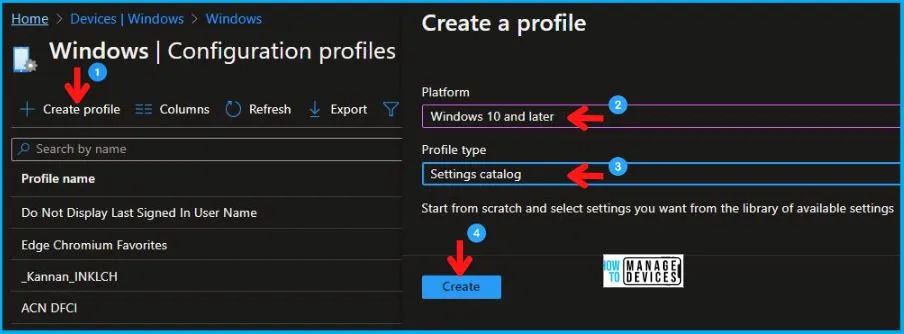
On the Basics tab pane, I provide a name for the policy as “Allow Network Connectivity During Connected-Standby Policy.” Optionally, if you want, you can enter a policy description and proceed by selecting “Next.”
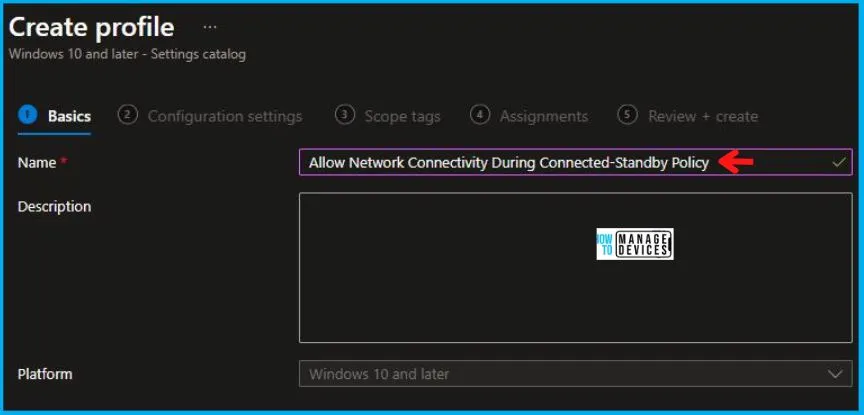
Now in Configuration Settings, click Add Settings to browse or search the catalog for the settings I want to configure.
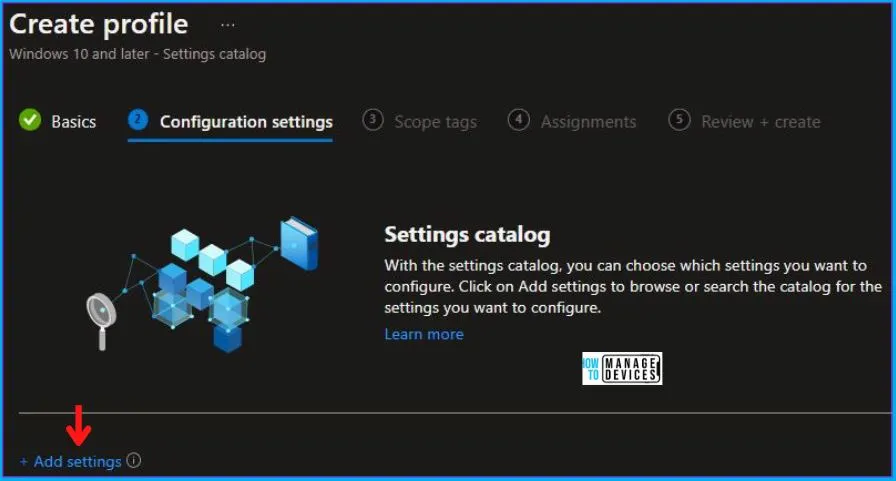
In the Settings Picker windows, I searched for the keyword Network Connectivity, I found the category Administrative Templates\System\Power Management\Sleep Settings and selected this.
When I select that option as stated above, I see one sub-category, Allow network connectivity during connected-standby (on battery). After selecting that, click the cross mark at the right-hand corner, as shown below.
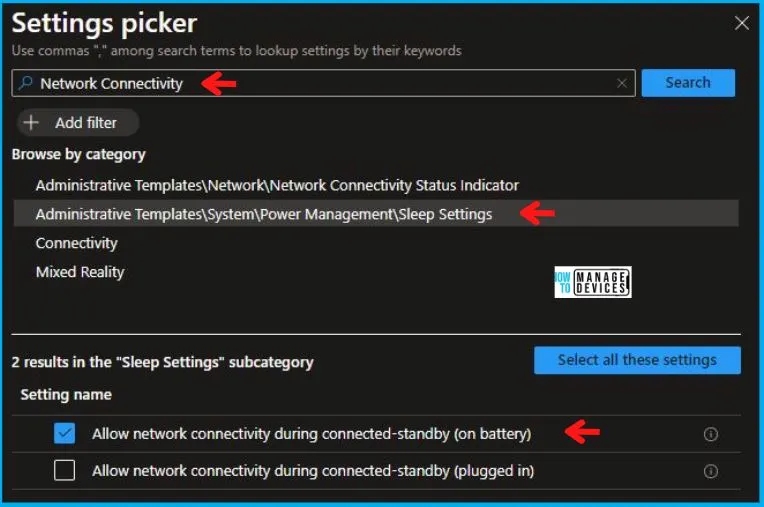
I kept the Allow network connectivity during connected-standby (on battery) as Disabled in the Administrative Templates and clicked on Next to continue.
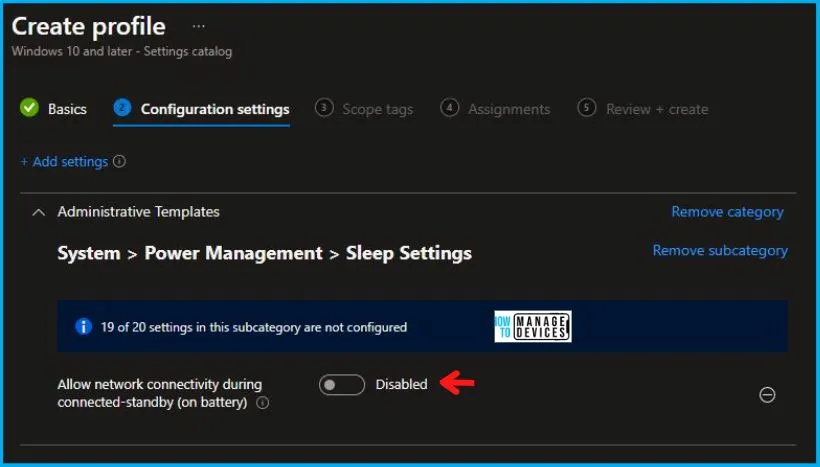
Using Scope tags, you can assign a tag to filter the profile to specific IT groups. One can add scope tags (if required) and click Next to continue. Now in Assignments, in Included Groups, you need to click on Add Groups, choose Select Groups to include one or more groups, and click Next to continue.
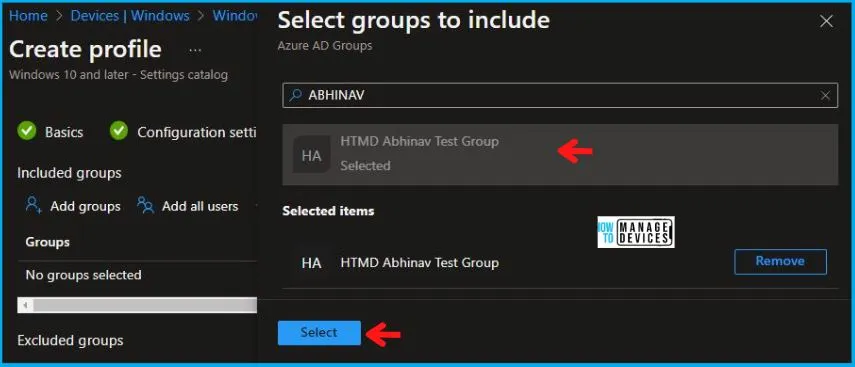
In the Review + Create tab, I review settings. After clicking on Create, changes are saved, and the profile is assigned.
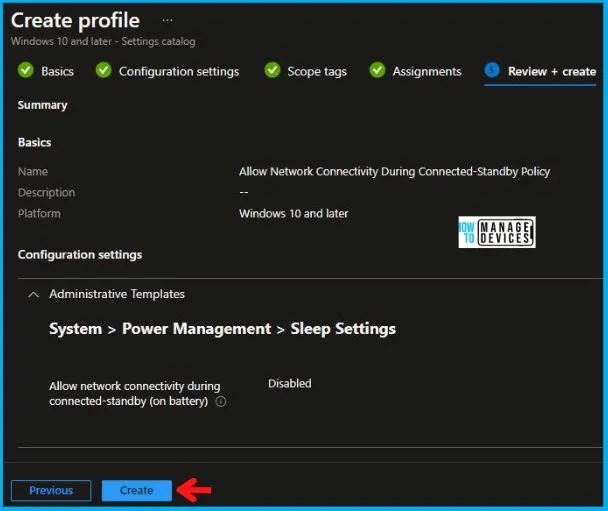
Upon successfully creating the “Allow Network Connectivity During Connected-Standby Policy,“ notification will appear in the top right-hand corner, confirming the action. You can also verify the policy’s existence by navigating to the Configuration Profiles list, where it will be prominently displayed.
Your groups will receive your profile settings when the devices check in with the Intune service. The Policy applies to the device.
Intune Report for Allow Network Connectivity During Connected-Standby Policy
From Intune Portal, you can view the Intune settings catalog profile report, which provides an overview of device configuration policies and deployment status.
To track the assignment of the policy, you need to select the relevant policy from the Configuration Profiles list. Reviewing the device and user check-in status lets you determine if the policy has been successfully applied. If you require more detailed information, you can click on “View Report” to access additional insights.
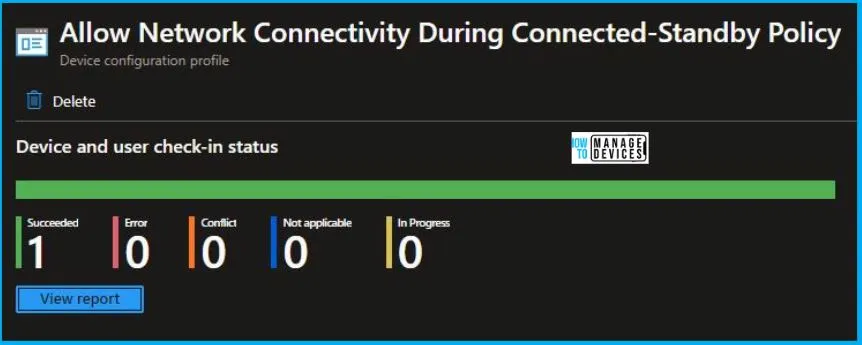
Intune MDM Event Log
To verify the successful implementation of String or integer policies on Windows 10 or 11 devices through Intune, you can leverage event IDs 813 and 814. These event IDs provide valuable insights into the application status of the policy as well as the specific value assigned to the policy on those devices. In the case of this particular policy, the value is String and is linked to the event ID 814.
By analyzing these event IDs, you can gain a clear understanding of the policy’s application status and the corresponding value associated with it on the devices in question.
To confirm this, you can check the Event log path – Applications and Services Logs – Microsoft – Windows – Devicemanagement-Enterprise-Diagnostics-Provider – Admin.
MDM PolicyManager: Set policy string, Policy: (DCConnectivityInStandby_2), Area: (ADMX_Power), EnrollmentID requesting merge: (5B88AEF1-09E8-43BB-B144-7254ACBBDF3E), Current User: (Device), String: (<disabled/>), Enrollment Type: (0x6), Scope: (0x0).
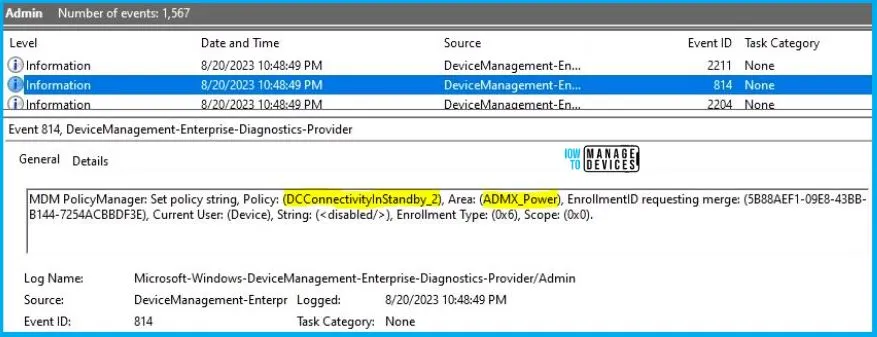
So when I open the above Event log, I found that the policy I have applied to the device is successfully implemented. By reviewing the log entry shown in the above image, the Event Viewer, I came across essential information, including the Area and Enrollment ID. These details play a significant role in identifying the corresponding registry path. To locate the specific information, please consult the table provided below:
| Area | Policy | String | Scoped | Event ID |
|---|---|---|---|---|
| ADMX_Power | DCConnectivityInStandby_2 | Disabled | Device | 814 |
The details presented in the table above for the Allow Network Connectivity During Connected-Standby Policy Using Intune can be employed to access the registry settings that hold the group policy configurations on a specific computer. To accomplish this, you can execute “REGEDIT.exe” on the target computer and navigate to the precise registry path where these settings are stored.
- Computer\HKEY_LOCAL_MACHINE\SOFTWARE\Microsoft\PolicyManager\providers\5B88AEF1-09E8-43BB-B144-7254ACBBDF3E\default\Device\ADMX_Power
When you navigate the above path in the Registry Editor, you will find the registry key named DCConnectivityInStandby_2. Also, when I navigated to the above path, I saw that the Registry Key was created.
| Registry Name | Value |
|---|---|
| DCConnectivityInStandby_2 | Disabled |

Author
Abhinav Rana is working as an SCCM Admin. He loves to help the community by sharing his knowledge. He is a B.Tech graduate in Information Technology.
